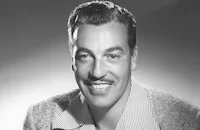Wintertime

Brief Synopsis
Cast & Crew
John Brahm
Sonja Henie
Jack Oakie
Cesar Romero
Carole Landis
S. Z. Sakall
Film Details
Technical Specs

Synopsis
Skip Hutton, the irrepressible co-owner of the Chateau Promenade in Canada, convinces his creditors to cease their foreclosure procedures for one night, when he will have Norwegian millionaire Hjalmar Ostgaard as his guest. Skip hopes that the presence of Ostgaard and his niece Nora, a world amateur skating champion, will stimulate business, despite the trepidations of his partner, Freddy Austin. Freddy is displeased that Skip has lied to Nora, who believes that they will be staying in the world-famous Chateau Frontenac, and so, upon picking her up at the train station, reveals the truth about her shabby accomodations. Nora kindly overlooks the deception as Ostgaard, sleepy from a cold, is put to bed, and joins Freddy for a cookout over the hotel fireplace. Nora and Ostgaard must remain in Canada to receive their quota numbers, with which they will emigrate to the United States, and while they wait, Nora schemes with Freddy, Skip and Brad Barton, the hotel band's wolfish singer, to trick Ostgaard into buying a fifty-percent interest in the chateau. With Ostgaard's money, Freddy is able to modernize the chateau and attract more business. Although Freddy and Nora begin to fall in love, Freddy is distracted by the appearance of Marian Daly, a photographer for an influential winter sports magazine. Marian makes no secret of her attraction to Freddy, who is forced to spend time with her in order to get a good review for the chateau. Nora becomes intensely jealous, and her problems increase when Ostgaard's money is frozen after Germany invades Norway. With no more money coming in, Ostgaard is afraid that the hotel will be taken from him, and Nora decides to help by accepting promoter Jay Rogers' offer to star her in an ice skating show in New York City. Due to the invasion of Norway, however, Nora's quota number is no longer valid and she cannot enter the United States unless she marries a U.S. citizen. Her relationship with Freddy having deteriorated, Nora plays up to Brad, who is unaware of her dire financial state. Thinking that he is marrying an heiress, Brad accepts Nora's suggestion that they elope, but Skip, determined to reunite Freddy and Nora, interferes with their plans. Thanks to Skip's machinations, Freddy and Nora reconcile and are soon married, after which Rogers presents Nora in her big show.

Director

John Brahm
Cast

Sonja Henie

Jack Oakie

Cesar Romero

Carole Landis

S. Z. Sakall

Cornel Wilde
Woody Herman
Helene Reynolds
Matt Briggs

Don Douglas
Geary Steffen
Charles Trowbridge

Nella Walker
Georges Renavent
Jean Del Val
Arthur Loft
Jean De Briac
Henri De Soto

Charles Irwin
Dick Elliott
Buford Mccusker
Fred Essler
Eugene Borden
Muni Seroff
Michael Westfall
Gwen Kenyon
Gus Corrado
Kay Linaker
Kate Harrington
Claire Whitney
Betty Roadman
Leila Mcintyre
Crew
James Basevi
Jesse Bastian
Harry Brand
Otto Brower
Nacio Herb Brown
Charles [g.] Clarke
Fanchon
James Gonzales
Roger Heman
Charles Henderson
Charles Henderson
Renè Hubert
Jack Jevne
Arthur Kober
William Lebaron
Thomas Little
Louis Loeffler
Joe Macdonald
Glen Macwilliams
Archie Mayo
E. Edwin Moran
Emil Newman
Guy Pearce
J. S. Pierpont
Maurice Ransford
Leo Robin
Carlos Romero
Walter M. Scott
Fred Sersen
Lynn Starling
Peter Ilyich Tchaikovsky
James Van Trees
Kenny Williams
Joseph Wright
Saul Wurtzel
Darryl F. Zanuck

Film Details
Technical Specs

Articles
Wintertime -
By Glenn Erickson

Wintertime -
Quotes
Trivia
Notes
The working title of this film was Quota Girl. According to information in the Twentieth Century-Fox Produced Scripts Collection at the UCLA Arts-Special Collections Library, executive producer Darryl F. Zanuck suggested the film's premise, based on the experiences of his maid, a Swedish national who obtained a quota number and U.S. entry visa through a stay in Canada. The following writers are listed in the scripts collection or Hollywood Reporter news items as having contributed to the screenplay, but the extent of their contribution to the completed film has not been determined: Franz Spencer, Robert Carson, Francis Wallace, Frederick Jackson and Walter Bullock. Hollywood Reporter news items supply the following information about the production: The picture was originally to be shot in Technicolor, be directed by H. Bruce Humberstone and feature Phil Regan. Due to wartime construction limits, the studio contemplated filming the picture entirely on location in Quebec, Canada, but instead filmed only background shots near Quebec and in Sun Valley, Idaho. For the Sun Valley location, Johnny Johnson accompanied second unit director Otto Brower, but the exact nature of Johnson's contribution to the film has not been determined. Although Joe MacDonald and Glen MacWilliams are credited onscreen as the film's photographers, Hollywood Reporter news items and production charts credit Charles Clarke and note that James Van Trees replaced MacDonald when MacDonald fell ill. Bufford McCusker replaced Geary Steffen as Sonia Henie's skating partner after Steffen was drafted. During the last month of filming, Archie Mayo took over direction of the ice skating production numbers. Studio publicity includes Helena Benda and Manuel Paris in the cast, but their participation in the finished film has not been confirmed.














